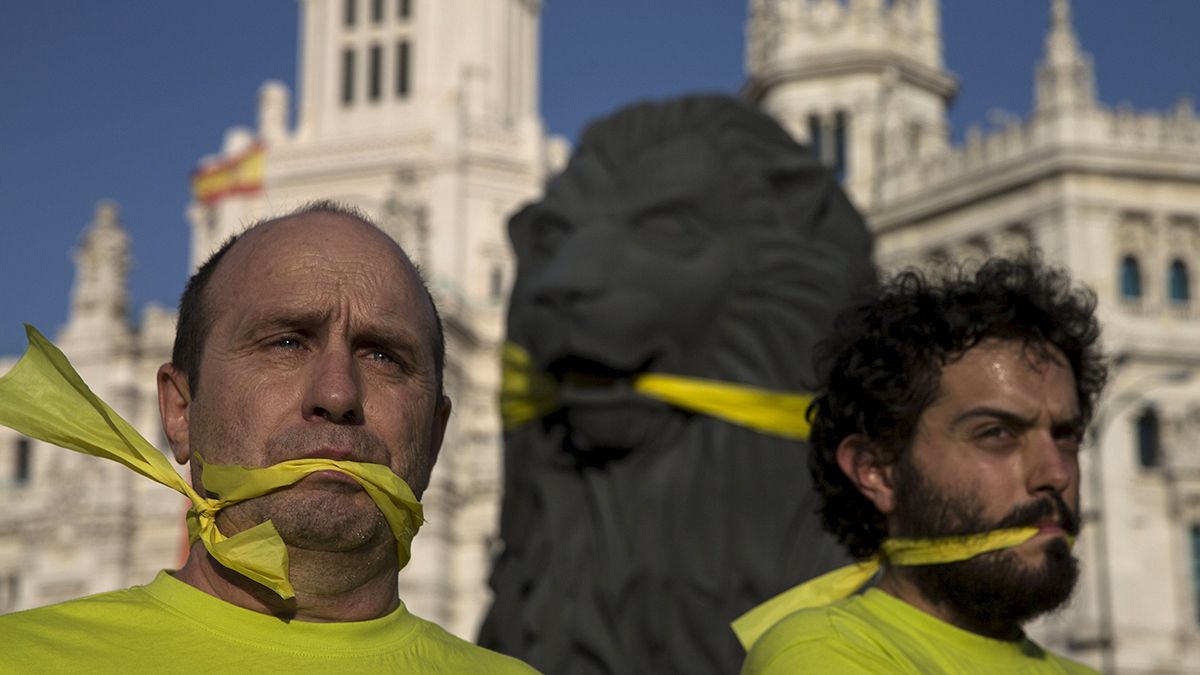Spain's 'ley mordaza'... the gag law comes into force.
A reform of Spaniards’ right to demonstrate has brought condemnation that it will stifle freedom of speech and assembly, and allow police to fine ‘offenders’ without a trial.
The Spanish Citizens’ Security Law under the Penal Code comes into force this July 1.
It was passed in parliament last December despite all groups except for the ruling conservative PP (Partido Popular) voting against the legislation.
The right of immigrants to apply for asylum is also curtailed under the reform.
Critics object that the new law is vague, and accuse the government of reacting disproportionately and unjustly to public anger over the economic crisis.
Public protest moved to a new level, democratically attaining political power in local elections in May, with successful candidates having campaigned against austerity and evictions.
These candidates became mayors in the key cities of Madrid, Barcelona and Valencia.
Political activists entered into mainstream politics on waves of anti-government and anti-bank protests, notably preventing police from evicting people from their homes because they were unable to make mortgage payments.
In spite of amendments made in parliament, many groups still denounce the Citizens’ Security Law as the worst news for Spanish Democracy since the dictator Franco.
Spain’s conservative government has been working on the reform since 2013.
In a country that only emerged from right-wing dictatorship in the late 1970s, opponents labeled it the ‘kick-in-the-teeth law’ because it penalises protest in what they call a flagrant disregard for democracy.
The opposition has asked the Constitutional Court to revoke the reform.
Some of the most controversial points
Critics say that very few demonstrations (around 1%) currently require police intervention.
The text attempts to justify the need for a reinforced security law citing “the social changes in the country [and] new forms of protest putting citizens’ security and tranquility at risk”. The governing People’s Party (Partido Popular) said “uncontrolled anti-system groups” had been taking advantage of the previous system.
Up to 600,000 euro fines for demonstrating
These fines apply in cases of unauthorised protests near “critical infrastructures” such as nuclear plants and transportation hubs. (The “Indignados” protesters in 2011 could have been fined with 600,000 € under the reform, since the Puerta del Sol – open public square and metro station in central Madrid – is considered a transport hub). Going ahead with a public performance such as a concert in violation of a security ban by authorities is also considered a “very serious breach”.
Up to 30,000 euro fines for…
disrupting public order during sports, political, cultural, religious or other events;
unauthorised use of photos or the personal data of police officers;
disturbing public order in a “spontaneous protest” (not authorised in advance) at state institutions such as the Congress of Deputies, the Senate, Regional Parliaments or Courts;
obstructing public authorities when carrying out “administrative decisions” (evictions);
refusing to disperse a demonstration;
consuming or possessing drugs in public spaces; growing cannabis.
“Light offences” are punishable by fines of 600 euros for a wide range of actions, such as showing a “lack of respect for security forces”, occupying public or private spaces or climbing on buildings or monuments.
In a separate reform, the government recently banned video recording or photographing the taking of suspects into custody, which sparked criticism from journalists and editors.
Definition of terrorism
Critics fear that the breadth of the definition of terrorism adopted in the Penal Code reform could qualify as a terrorist almost anyone for…
criticising the government, security forces or the Spanish monarchy;
regular consultation of web pages with “terrorist content”;
leaking documents;
media coverage of protests or the broadcasting or publishing of messages that could “encourage others” to break the law. Social networks are specifically mentioned; originally this was aimed at fighting jihadist propaganda, but activists warn this could lead to punishment for legitimate political usage of the Internet.
Immigration
The initial draft reform allowed Spanish police to return immigrants to Morocco when caught jumping the fences of Ceuta and Melilla “in groups”. It has been amended since but human rights organisations fear how it will be implemented.
It also allows police checks of people “based on appearance or race”, NGOs say, as police can ask to identify anyone covering his or her face, even only a part of it.
How the government presents the reform
The Spanish government says this is a “deeply democratic” reform that aims to secure the “normal, free living of everyone”. Interior Minister Jorge Fernández Díaz defended the law in ABC newspaper
Citizen’s security law, Penal Code reform FULL TEXT in Spanish.
Critics
A wide range of organisations (and all the opposition parties) have criticised the reforms.
United Nations High Commissioner for Human Rights
International Federation for Human Rights
Greenpeace
Spain's new gag laws make a mockery of democracy. €600,000 in fines for hanging banners! http://t.co/xyeRzkMiropic.twitter.com/kaYSz8CuYS
— Greenpeace (@Greenpeace) abril 3, 2015
